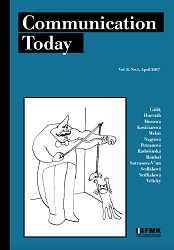CURRENT DEVELOPMENT TRENDS OF MEDIA LITERACY IN EUROPEAN UNION COUNTRIES
CURRENT DEVELOPMENT TRENDS OF MEDIA LITERACY IN EUROPEAN UNION COUNTRIES
Author(s): Dana Petranová, Monika Hossová, Peter VelickýSubject(s): Social Sciences, Education, Media studies, Communication studies, Theory of Communication, History of Education, State/Government and Education
Published by: Univerzita sv. Cyrila a Metoda v Trnave, Fakulta masmediálnej komunikácie
Keywords: areas of media education; European Union; film literacy; Internet literacy and online safety; media education; media literacy; news and reading literacy; non-formal education; digital game literacy;
Summary/Abstract: The study deals with an investigation into the processes and projects related to the development of media education and media literacy education in the countries of the European Union. The study assesses media education activities in individual EU Member States in terms of various initiatives and projects and their primary focus. The aim of the study is to identify areas of media education and literacy to which European countries devote most attention. The authors aim to summarise and compare projects that have significantly contributed to media education development through their activities towards media education of citizens and improving media literacy in the EU. The text also focuses on extra curricular, non-formal education concentrated around activities and projects outside of the formal education system; those are mainly implemented by companies and non-profit organisations in order to involve selected groups of the population. In the text, the authors analyse secondary data and results of published researches and theoretical studies on the given topic. The introduction provides a brief description of formal, non-formal and informal education in terms of their goals and differences. The authors then characterise the areas of media education by categorising individual types of literacy (including media literacy, literacy involving critical analysis of media content, digital and information literacy, film literacy, news and reading literacy, Internet literacy and online safety, digital game literacy and media communication literacy). Existing initiatives in the EU countries are provided as examples in the identified areas and literacies. The given information is used to create a summary of the current media education activities and the dominant focal points of non-formal education initiatives in individual EU countries. The study thus offers an overview of the types of literacies and organisations actively contributing to the formation of a media literate EU population.
Journal: Communication Today
- Issue Year: 8/2017
- Issue No: 1
- Page Range: 52-65
- Page Count: 14
- Language: English

